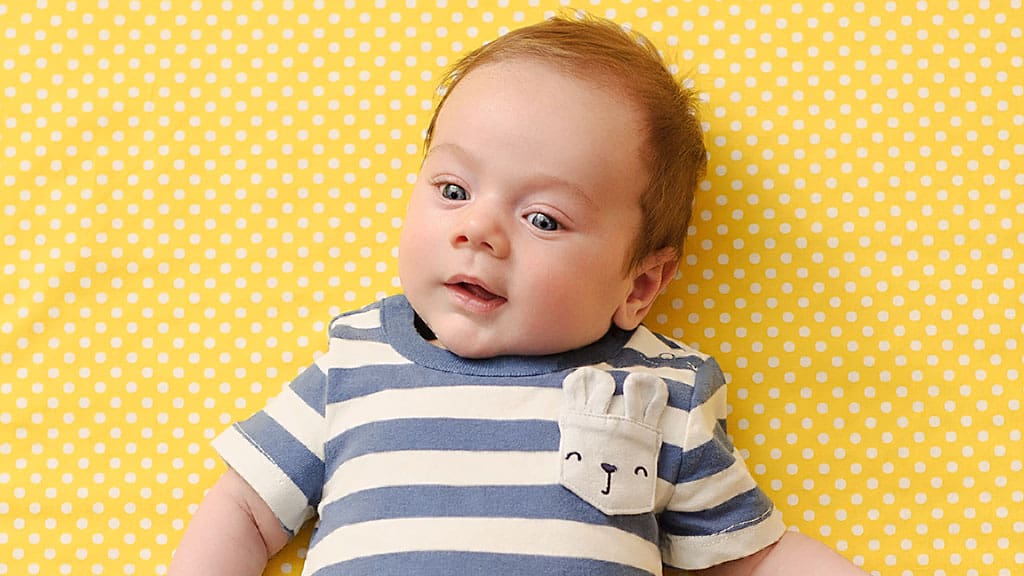
Table of Contents
Not willing to breastfeed your baby for way too long? Week 8 could be a nice timeline to look at baby supplement options and perhaps, give your body the love it deserves. Let’s learn about being patient with postpartum recovery!
Your baby's eighth week after birth
Your baby is turning eight weeks and it’s time to bring in some fun learning opportunities. No one can learn faster than babies. As a parent, you can provide them with plenty of sensory-stimulating opportunities. Opt for some auditory and visually stimulating toys and infant play gyms. An infant’s circuits can get overloaded pretty easily so try not to go overboard. Once your little one has had enough, they’ll start squirming or fussing.
You can experience their first adorable babbling sounds and noises. Also, during tummy time, they might even rollover. Your home will be filled with adorable laughs and squealing in delight over your antics. While you’re at it get your little one baby-safe mirrors. They tend to find their reflections fascinating.
Your 8-week-old baby's development and physical growth
Let’s have a look at what is happening with your baby and in their body in terms of their physical development eight weeks after birth.
1. Your baby’s weight:
- When your baby is eight weeks old, their average weight should be 11.3 pounds, if you have a baby girl and the average baby boy should weigh 12.3 pounds. Also, for baby girls, the average height should be 22.5 inches and baby boys should be 23 inches.
- You can thank the all-liquid diet that your little one is still on, for all that growth. Their diet could be formula or breast milk or a combination of both.
2. Your baby’s sleep:
- Now, your 8-week old baby can tell the difference between day and night. Naturally, your little one will start sleeping more during the night than in the daytime. Rest assured, before waking up for a feed, your baby might start sleeping for longer stretches at night.
- Your little one needs about 14 to 17 hours of sleep a day on average. This includes three or more hours of daytime naps. Although, remember that every baby is different.
- While some babies wake up once during nighttime just for a feed, others during the night will need to be fed at least twice or three times. It depends on your baby and luck of the draw.
- There are parents with an 8 week-old who sleeps uninterrupted for five hours or more at night already, but some parents still wake up several times during nighttime.
- During early infancy, night-waking is completely normal and healthy. So, hang in there because things will improve soon!
3. Your baby’s diet:
- During the first six months, all your baby needs is milk. Ideally, it should be breastmilk, however, if you are unable to, it’s okay!
- An average 8-week-old baby needs around 720ml to 960ml of milk per day. Remember to spread it over six to nine feeds.
- If you plan to exclusively breastfeed your little one, they should have a daily vitamin D supplement which is 8.5 to 10 micrograms.
- At this age, you can use both breast milk or formula. They need 4 to 6 ounces every three to four hours.
- Also, if your baby is going to be formula fed, expect to nurse around 6 to 10 times in 24 hours.
Your 8-week-old baby's reflexes
Movement and head control:
- Your little one is beginning to try to push themselves up. Especially during tummy time, they will probably be able to hold their head at a 45-degree angle.
- During the 8th week, your baby will have better control over their arms and legs. They’ll be capable of wriggling, waving, and kicking much more smoothly.
- By now, your baby will lose their ‘grasp reflex’. Slowly and gradually, they won’t grip your finger or an object instinctively. However, they’ll start to grasp and unclasp objects much more purposefully.
Sight, hearing, and awareness:
- Now, your little one will pay close attention to other people’s faces. They might be able to recognize people. They might recognize you and your family. Your baby will try to look at you whenever you’re nearby.
- They can recognize brightly colored objects that are further away.
- Also, your baby can tell what direction a sound is coming from.
Social, emotional, and communication:
- As your little one gets better at expressing themselves, the amount of crying should start to lessen too. Your 8-week-old baby might, on average, cry for just around 40 minutes a day or 4 hours per day.
- Your baby will also start vocalizing in other ways such as cooing, gurgling, and humming.
- Moreover, for your baby’s language development they need to cry, coo, and make other sounds. Your little one is learning how to control their lungs, vocal cords, and muscles used in speech.
Your 8-week-old baby's health
- At 6 to 8 weeks, your general practitioner will give your baby a full physical examination.
- This physical examination will include checking their eyes, heart, hips, and testicles (for boys).
- Moreover, at 8 weeks you need to schedule your baby’s first vaccinations. You need to vaccinate your little one to protect your child against hepatitis B, meningitis B, pneumococcus, rotavirus, diphtheria, Hib (Haemophilus influenza b), polio, tetanus, and whooping cough (pertussis).
Activities and games for your 8-week-old baby
- When your little one starts making sounds, smile and act excited. Sometimes you can copy their sounds however remember to use clear language so they can start to learn and understand words.
- You can talk, read and sing and look at pictures together.
- You can play peek-a-boo with them.
- Remember daily tummy time for your baby.
- Also, you should encourage your little one to reach for their favorite toys.
- Your baby can look at themselves in a baby-safe mirror.
Postpartum baby tips: Week 8 after birth
Understand your baby’s bowel movements
Why does your baby have fewer bowel movements each day?
Despite eating all day, your little one might start having less bowel movements. There’s no reason to be alarmed if your little one does not poop for a day or two. As your baby is getting bigger, their bowels start to get bigger, too. Also, it is normal if your baby is still a prolific pooper.
Understanding and calming your fussy baby
One of life’s most cherished and time-honored rituals for a parent and their baby is rocking them in a rocking chair or glider. It’s a deeply calming experience for both of you.
With modern parenting rocking, you can rock your baby hands-free, too. A fussy baby would like a motorized baby swing, vibrating seat, or automatic cradle.
- Note: For these devices, you need to follow the manufacturer’s safety directions for age and weight restrictions. Don’t let your baby nap in them too. They might become independent when on the motion to fall asleep over time. Transfer them to the crib once they get to sleep.
Understanding how to massage your baby
This can be a wonderfully relaxing ritual for both you and your baby. Massaging is a great way to soothe your little one’s cries. Though they aren’t necessary, you can experiment with lotion or special baby massage oils. Your touch should be gentle yet firm enough so that it’s not ticklish.
How to massage your 8-week-old baby?
Start with stroking your baby’s chest from the center outward and make small circles around their stomach and belly button.
Then, gently roll your little one’s arms and legs between your hands. Take turns with each limb or try alternating your hands in a “milking” motion where you stroke each limb from their core to their extremities.
Unfurl their small fists and rub their palms and fingers. Move onto the soles of your baby’s feet and uncurl their toes too.
Finally, turn your baby on their tummy and stroke their back from side to side, then up and down.
Understanding the health risks associated with an 8-week-old baby
What is croup and how does it affect babies?
This is a viral infection that will cause inflammation in a baby’s voice box and windpipe. In turn, it will lead to their vocal cords swelling and a harsh bark-like cough. Usually, croup starts with minor symptoms of cold such as a runny nose, irritability, and possibly a fever.
The mother's body after childbirth: What is happening in your body in the eighth week after giving birth?
Post-pregnancy body changes
Some long-term post-baby body changes include:
- During pregnancy, most women experienced swollen feet. If your feet get bigger, you need to get used to your new shoe size. You might be wearing those larger-size shoes for good now.
- After your hips expand for childbirth, they might be forever slightly widened.
- Your nipples might remain darker and bigger as well.
- Do not be too focused on your body changes and remind yourself that your body will experience a lifetime of happiness because you gave birth to the sweetest baby.
Some pumping basics
- The idea of pumping can be a little overwhelming.
- Freeze your breast milk and use the time before you go back to work to get started on saving your milk.
- It’ll take you a couple of weeks to get into the habit of pumping breast milk.
- If you haven’t already, get your baby used to the nipple of a bottle.
- As you start getting used to the idea of pumping, freeze your milk as much as you can.
- There are different types of breast pumps you can choose from. Use a hand pump, a battery-powered or an electric pump.
- Although a high-tech electric pump looks intimidating, it usually won’t hurt.
- Also, electric pumps are a little noisier than hand pumps. However, electric pumps will stimulate your breasts more effectively and ensure speedier delivery (plus the double-pump saves time).
Final Thoughts
Babies grow up at different rates. However, this guide includes some development milestones you need to look out for once your baby turns 8 weeks old. Remember if your little one doesn’t match this pattern, there’s nothing to worry about. Nonetheless, if you’re concerned that your child missed out on one or more important milestones, do not hesitate to speak to your health visitor or general practitioner. Moreover, don’t be so hard on yourself! You’re doing great! With time you will get a better hang of things. With experience and awesome parental instincts, you’ll be a pro at being a parent!
FAQs- Your 8-Week-Old Baby: Development, Growth, Health, Postpartum, New Baby Tips & Recommended Products
1.What should an eight-week-old baby be doing?
2.How can I play with my 8-week old baby?
3. How much should a 2-month old weight?
Reviewed By-

Nimrat, Pediatrics
Dr. Nimrat S Sidhu is a practicing pediatrician for about 5 years now and holds an MD pediatrics degree. She was the topper of her batch, has always had a keen interest in her core medical field, and is specially trained for neonatal resuscitation.





